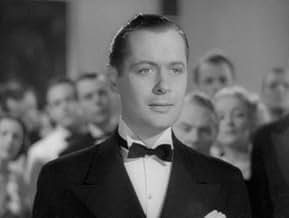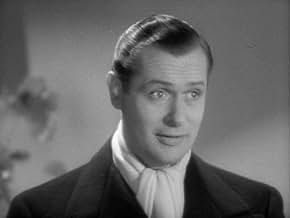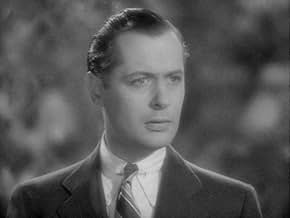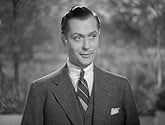VALUTAZIONE IMDb
6,0/10
987
LA TUA VALUTAZIONE
Aggiungi una trama nella tua linguaA society girl tries to reform her playboy husband by making him jealous.A society girl tries to reform her playboy husband by making him jealous.A society girl tries to reform her playboy husband by making him jealous.
- Regia
- Sceneggiatura
- Star
- Premi
- 3 vittorie totali
Charles Ruggles
- Edgar
- (as Charlie Ruggles)
Joan Fontaine
- Caroline
- (as Joan Burfield)
John David Horsley
- Duffy
- (as David Horsley)
E.J. Babille
- Desk Clerk
- (as E.J. Babiel)
Jean Acker
- Nightclub Extra
- (non citato nei titoli originali)
Gertrude Astor
- Nightclub Extra
- (non citato nei titoli originali)
Clem Beauchamp
- Drunk
- (non citato nei titoli originali)
Brooks Benedict
- Joe Williams - Bar Owner
- (non citato nei titoli originali)
Veda Buckland
- Marcia's Maid
- (non citato nei titoli originali)
Recensioni in evidenza
There's a word for the character, Sherry Warren, often used in the past, that much better describes him than the most frequently used polite term, womanizer. Robert Montgomery's role in "No More Ladies," may be the best character performance of the worst despicable cad in films. His sweet appearance, persona and laissez faire attitude about relationships, responsibility, love and marriage are revolting to real manhood. He's hedonistic, completely self-centered and selfish. And he's a consummate liar whose off-hand insistences of his honesty show him to be a person with little to no ethics or morality.
After a number of scenes in which Sherry lies to Joan Crawford's Marcia or someone else, Marcia catches him in a direct lie to her. Then when they are together and Marcia asks him about honesty and his other loves, he says, "No lies, you understand. Never have been any. Never will be any. Now do you want an answer?" When Marcia says, "Please," he says, "Yes. I would have told you anyway. I couldn't have lied to you."
With a cast of huge names of the day, "No More Ladies" just covered its budget in box office sales with a small domestic market profit. One has to wonder what many people thought watching such a film in the midst of the Great Depression. Where many films about wealthy and night time partying were uplifting because they had some real comedy and/or involved working people, the entire setting for this film is super wealthy, idle-rich, and most of the people living solely for their individual personal pleasure at the moment. Charles Ruggles' character, Edgar, is a sot, three-sheets to the wind most of the time.
This film is a very talky one, and it has spry dialog that is witty at times, conflicted at times, and very funny on occasion. Joan Crawford plays opposite Montgomery and has top billing by MGM for the female glamor appeal. Besides another leading man of the period in a supporting role - Franchot Tone (who would marry Crawford five months after this film came out), a top supporting cast includes Charles Ruggles, Edna May Oliver, Reginald Denny, Arthur Treacher, and Gail Patrick. It's also the first film appearance of Joan Fontaine at age 17, under the name of Joan Burfield.
Movie buffs may find this movie interesting for its hedonistic portrayal of a rare segment of the population in the mid-1930s, and for the wordy dialog, especially the skewed philosophical remarks at times.
None of the performances are outstanding, and the subject matter of loose, carefree living with no regard for most people isn't very appealing as a theme. So, many people might be put off by it while others will find it quite boring. My six stars are for the cast and writing of the quick exchanges in dialog - not necessarily the screenplay itself.
Here are some favorite lines.
Fanny, "I know - my contemporaries give me a swift pain. So do most old people."
Oliver, "You look exactly as a man wants a grandmother to look." Fanny, "I know - I always have."
Edgar, "He drinks like a fish - like two fishes."
Marcia, "Sherry, you've played around with life so long, you won't know an honest emotion if you saw one."
Sherry, "Marcia wouldn't marry me." Fanny, "Don't be sure. She hasn't got much sense. I sort of counted on you. Now I can't even be sure of you."
Sherry, "I'm sorry. I thought you liked having me around more or less." Marcia, "I do. More, or less. Either one or the other. There now you've got it." Sherry, "You, you, you aren't asking me to... to marry you by any...no thank you ... I hate olives."
Sherry, "Why don't people trust me?" Fanny, "Maybe it's because they know you."
Fanny, "Any crook worthy of the name has a getaway arranged."
Marcia, "Are all fighters affectionate?" Sherry, "I don't, as a rule, neck them." Marcia, "What a lot you miss."
Fanny, "Good heavens, Casabianca. The ship's sinking."
Marcia, on the phone with Sherry, "What? Fanny says you're nothing to boast about in any circle."
Sherry, checking his watch, "Maybe I'm a little slow." Theresa, "That isn't what I heard about you."
Edgar, "Where do you suppose that girl went? Maybe she's been kidnapped. I wouldn't put it past her."
Fanny, "She swiped your car, kidnapped your prize-fighter, and disappeared into the night - I feel better now."
Edgar, pointing to a Pekingese dog a woman is carrying, "Do you think it'll be safe with that little hors d'oeuvre going in the same car with Rover? Heh, heh, he hasn't had his dinner yet, you know."
After a number of scenes in which Sherry lies to Joan Crawford's Marcia or someone else, Marcia catches him in a direct lie to her. Then when they are together and Marcia asks him about honesty and his other loves, he says, "No lies, you understand. Never have been any. Never will be any. Now do you want an answer?" When Marcia says, "Please," he says, "Yes. I would have told you anyway. I couldn't have lied to you."
With a cast of huge names of the day, "No More Ladies" just covered its budget in box office sales with a small domestic market profit. One has to wonder what many people thought watching such a film in the midst of the Great Depression. Where many films about wealthy and night time partying were uplifting because they had some real comedy and/or involved working people, the entire setting for this film is super wealthy, idle-rich, and most of the people living solely for their individual personal pleasure at the moment. Charles Ruggles' character, Edgar, is a sot, three-sheets to the wind most of the time.
This film is a very talky one, and it has spry dialog that is witty at times, conflicted at times, and very funny on occasion. Joan Crawford plays opposite Montgomery and has top billing by MGM for the female glamor appeal. Besides another leading man of the period in a supporting role - Franchot Tone (who would marry Crawford five months after this film came out), a top supporting cast includes Charles Ruggles, Edna May Oliver, Reginald Denny, Arthur Treacher, and Gail Patrick. It's also the first film appearance of Joan Fontaine at age 17, under the name of Joan Burfield.
Movie buffs may find this movie interesting for its hedonistic portrayal of a rare segment of the population in the mid-1930s, and for the wordy dialog, especially the skewed philosophical remarks at times.
None of the performances are outstanding, and the subject matter of loose, carefree living with no regard for most people isn't very appealing as a theme. So, many people might be put off by it while others will find it quite boring. My six stars are for the cast and writing of the quick exchanges in dialog - not necessarily the screenplay itself.
Here are some favorite lines.
Fanny, "I know - my contemporaries give me a swift pain. So do most old people."
Oliver, "You look exactly as a man wants a grandmother to look." Fanny, "I know - I always have."
Edgar, "He drinks like a fish - like two fishes."
Marcia, "Sherry, you've played around with life so long, you won't know an honest emotion if you saw one."
Sherry, "Marcia wouldn't marry me." Fanny, "Don't be sure. She hasn't got much sense. I sort of counted on you. Now I can't even be sure of you."
Sherry, "I'm sorry. I thought you liked having me around more or less." Marcia, "I do. More, or less. Either one or the other. There now you've got it." Sherry, "You, you, you aren't asking me to... to marry you by any...no thank you ... I hate olives."
Sherry, "Why don't people trust me?" Fanny, "Maybe it's because they know you."
Fanny, "Any crook worthy of the name has a getaway arranged."
Marcia, "Are all fighters affectionate?" Sherry, "I don't, as a rule, neck them." Marcia, "What a lot you miss."
Fanny, "Good heavens, Casabianca. The ship's sinking."
Marcia, on the phone with Sherry, "What? Fanny says you're nothing to boast about in any circle."
Sherry, checking his watch, "Maybe I'm a little slow." Theresa, "That isn't what I heard about you."
Edgar, "Where do you suppose that girl went? Maybe she's been kidnapped. I wouldn't put it past her."
Fanny, "She swiped your car, kidnapped your prize-fighter, and disappeared into the night - I feel better now."
Edgar, pointing to a Pekingese dog a woman is carrying, "Do you think it'll be safe with that little hors d'oeuvre going in the same car with Rover? Heh, heh, he hasn't had his dinner yet, you know."
For sporadic moments of amusement "No More Ladies" is perfectly satisfactory. It has the MGM lusciousness and gleam that the other studios envied. Note the great looking costumes on Joan Crawford, Joan Fontaine, and Gail Patrick wear. The sophistication is showed by the ho-ho-ho jokes that are dropped by the likes of Crawford, Robert Montgomery, Franchot Tone, and Edna Mae Oliver. This is the type of film that has the hero with a name like "Sherry". People go to night clubs, and to fancy restaurants, and take drives in Central Park at night (it is, after all, the 1930s).
The film is a bore - it occasionally amuses because of the cast, but the dialog is brittle for the sake of brittle. It is Noel Coward's world but not the real wit he brought - Coward's best plays show a streak of harshness and mutual malevolence mixed with affection in his couples like Amanda and Elyot in "Private Lives". They also tend to be smarter than the characters here.
Also the characters are not all that amusing nowadays. Montgomery's cousin is Charlie Ruggles, who is constantly drunk. Ruggles is a favorite comedian to me, but here he was dull. Reginald Denny is around as a British version of Ralph Bellamy - an available alter-suitor to Montgomery for Crawford, and while Denny is elegant (in a skittish sort of way) he is not at all as amusing as Ralph Bellamy was in "His Girl Friday" or The Awful Truth".
After watching this film I stopped to consider the three leads. Montgomery was typecast for most of the 1930s (except for an occasional film like "The Big House") as a happy, amoral socialite. Nobody really played the upper-crust cad as well as he did, but he got bored by it, and fought for meatier parts - and after his brilliant Danny in "Night Must Fall" he got them. Crawford reveled in parts like the hard-working lower class girl fighting her way to happiness, but she did many "socialite" parts as well. Along came "The Women", and she played a villainous social climber. After that came the really hard-boiled darker parts of the 1940s and 1950s like "Mildred Pierce" and "A Woman's Face" and "Flamingo Road". Tone, in 1935, would start having roles like Bryam in "Mutiny On The Bounty" - like Montgomery he would play his wealthy cads, but he would be able to step into nastier, meatier roles like "The Phantom Lady" and "The Man On The Eiffel Tower". When one talks to their fans about the great work of these three actors, it is the films where they played characters with demons after them that are recalled. Few really recall a piece of meaningless cotton candy like "No More Ladies" regarding any of them.
The film is a bore - it occasionally amuses because of the cast, but the dialog is brittle for the sake of brittle. It is Noel Coward's world but not the real wit he brought - Coward's best plays show a streak of harshness and mutual malevolence mixed with affection in his couples like Amanda and Elyot in "Private Lives". They also tend to be smarter than the characters here.
Also the characters are not all that amusing nowadays. Montgomery's cousin is Charlie Ruggles, who is constantly drunk. Ruggles is a favorite comedian to me, but here he was dull. Reginald Denny is around as a British version of Ralph Bellamy - an available alter-suitor to Montgomery for Crawford, and while Denny is elegant (in a skittish sort of way) he is not at all as amusing as Ralph Bellamy was in "His Girl Friday" or The Awful Truth".
After watching this film I stopped to consider the three leads. Montgomery was typecast for most of the 1930s (except for an occasional film like "The Big House") as a happy, amoral socialite. Nobody really played the upper-crust cad as well as he did, but he got bored by it, and fought for meatier parts - and after his brilliant Danny in "Night Must Fall" he got them. Crawford reveled in parts like the hard-working lower class girl fighting her way to happiness, but she did many "socialite" parts as well. Along came "The Women", and she played a villainous social climber. After that came the really hard-boiled darker parts of the 1940s and 1950s like "Mildred Pierce" and "A Woman's Face" and "Flamingo Road". Tone, in 1935, would start having roles like Bryam in "Mutiny On The Bounty" - like Montgomery he would play his wealthy cads, but he would be able to step into nastier, meatier roles like "The Phantom Lady" and "The Man On The Eiffel Tower". When one talks to their fans about the great work of these three actors, it is the films where they played characters with demons after them that are recalled. Few really recall a piece of meaningless cotton candy like "No More Ladies" regarding any of them.
Broadway must have had dozens of these drawing room comedies featuring rich, well-dressed people speaking snappily to one another. I say "must have" because Hollywood seems to have adapted all of them. "No More Ladies" is yet another one, and for my money, it's pretty routine. Joan Crawford is a rich girl in love with a cad, played by Robert Montgomery. They marry and he's still a cad. In fact, instead of going to their country house one weekend, he delays his trip and has a dalliance with a woman named Therese. He admits this when he finally shows up in the country. He has little choice when he learns that his alibi, Charlie Ruggles, is actually at the country home. In retaliation, Crawford invites an old beau and a couple of ex-girlfriends to a huge party.
The dialogue is witty, the clothes are glamorous, the apartment and house are sumptuous, and the performances are very good. Montgomery was always perfect in these roles, and Crawford is attractive and spars with Montgomery well. Edna Mae Oliver is superb as always. Charles Ruggles plays a somewhat annoying drunk. Gail Patrick, who became Gail Patrick Jackson and produced "Perry Mason," having married Erle Stanley Gardner's agent, does very well as the pretty other woman.
This is one of those films where one asks, so why wasn't I crazy about it? The only reason is that there was a sameness about it and nothing really to differentiate it - including the cast - from all the other light, romantic comedies. It's no wonder that Robert Montgomery fought so hard to make "Night Must Fall." He was incredibly bored with these roles. It's understandable.
The dialogue is witty, the clothes are glamorous, the apartment and house are sumptuous, and the performances are very good. Montgomery was always perfect in these roles, and Crawford is attractive and spars with Montgomery well. Edna Mae Oliver is superb as always. Charles Ruggles plays a somewhat annoying drunk. Gail Patrick, who became Gail Patrick Jackson and produced "Perry Mason," having married Erle Stanley Gardner's agent, does very well as the pretty other woman.
This is one of those films where one asks, so why wasn't I crazy about it? The only reason is that there was a sameness about it and nothing really to differentiate it - including the cast - from all the other light, romantic comedies. It's no wonder that Robert Montgomery fought so hard to make "Night Must Fall." He was incredibly bored with these roles. It's understandable.
This film is not entirely dismal. Robert Montgomery is light and smooth as the playboy who nails anyone he wants, including the wives of his friends. The long list includes Gail Patrick, who plays Carole Lombard's nasty older high society sister in "My Man Godfrey". In this bizarro world film, she is a banjo playing bar fly. Anyway, before RM and Joan Crawford get married, he is told not to go into her room because she is in bed. Response: "Since when is a lady in bed an object of repugnance?" Joan runs around in sharp designer outfits, and restrains herself from chewing the scenery - much. In short, some snappy dialogue amid the heavy drinking and innuendos. To quote someone clever, "marriage is the death of hope and the birth of despair." BC
Though the careers of Robert Montgomery, Joan Crawford, and her husband at the time, Franchot Tone's respective careers were not hurt by films like No More Ladies, this was the kind of stuff all three of these players were looking to get out of.
There was a truism at MGM back in its heyday. For films where the men wear tuxedos you first get Robert Montgomery. If he turns it down get Franchot Tone. If it's bad enough for Tone to turn it down God help him, Robert Young is stuck with it. So knowing the pecking order and knowing the billing, you can guess who Crawford winds up with.
Robert Montgomery plays another of those irrepressible womanizing playboys who's sowed enough wild oats to qualify for a farm subsidy. He's decided to settle down with society girl Joan Crawford who has certain ideas about infidelity and how wrong it is. Montgomery behaves at first, but when he uses their perpetually inebriated friend Charlie Ruggles as an alibi that doesn't hold up, Crawford decides on some revenge with Franchot Tone.
No More Ladies is harmless enough and when Edna May Oliver as Joan's grandmother is on the screen, always entertaining. But it was the stuff that MGM was grinding out in its dream factory. It was a case of Montgomery and Tone look great in tuxedos so cast them as urban playboys.
Well, both of them did look great, Louis B. Mayer wasn't wrong about that.
There was a truism at MGM back in its heyday. For films where the men wear tuxedos you first get Robert Montgomery. If he turns it down get Franchot Tone. If it's bad enough for Tone to turn it down God help him, Robert Young is stuck with it. So knowing the pecking order and knowing the billing, you can guess who Crawford winds up with.
Robert Montgomery plays another of those irrepressible womanizing playboys who's sowed enough wild oats to qualify for a farm subsidy. He's decided to settle down with society girl Joan Crawford who has certain ideas about infidelity and how wrong it is. Montgomery behaves at first, but when he uses their perpetually inebriated friend Charlie Ruggles as an alibi that doesn't hold up, Crawford decides on some revenge with Franchot Tone.
No More Ladies is harmless enough and when Edna May Oliver as Joan's grandmother is on the screen, always entertaining. But it was the stuff that MGM was grinding out in its dream factory. It was a case of Montgomery and Tone look great in tuxedos so cast them as urban playboys.
Well, both of them did look great, Louis B. Mayer wasn't wrong about that.
Lo sapevi?
- QuizBig-screen debut of Joan Fontaine (listed as Joan Burfield).
- BlooperWhen Sherry and Fanny are talking in front of the fireplace, from one scene to the next his position changes back and forth. First he's standing and facing Fanny, who is sitting as they talk; then he is to her side, kneeling on a sofa bench with his back to her and leaning on the fireplace hearth. Then he is back opposite her, standing and facing her as they talk; then he's back kneeling on the sofa and leaning on the hearth. Then he's once again standing and facing Fanny.
- Citazioni
Oliver Allen: Look here, you can't go up there--she might be in bed!
Sheridan 'Sherry': Since when has a lady in bed been an object of repugnance?
- ConnessioniFeatured in Joan Crawford: The Ultimate Movie Star (2002)
- Colonne sonoreAll I Do Is Dream Of You
(1934) (uncredited)
Music by Nacio Herb Brown
Lyrics by Arthur Freed
Played on banjo by Arthur Treacher and
Sung by Gail Patrick at the party
I più visti
Accedi per valutare e creare un elenco di titoli salvati per ottenere consigli personalizzati
Dettagli
Botteghino
- Budget
- 765.000 USD (previsto)
- Tempo di esecuzione1 ora 20 minuti
- Colore
- Proporzioni
- 1.37 : 1
Contribuisci a questa pagina
Suggerisci una modifica o aggiungi i contenuti mancanti

Divario superiore
By what name was Non più signore (1935) officially released in India in English?
Rispondi


































